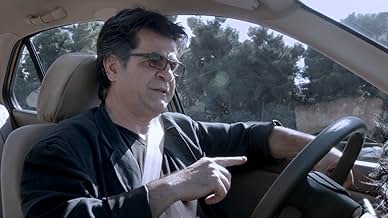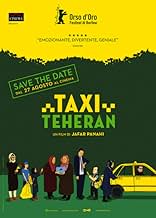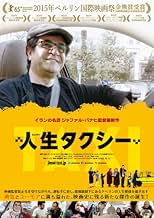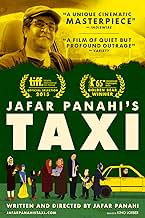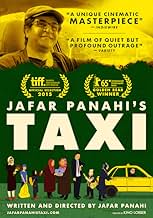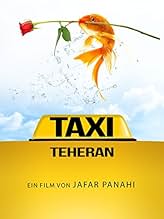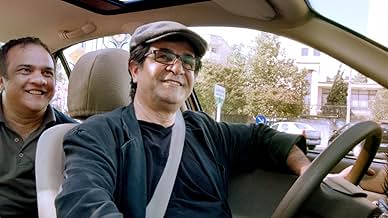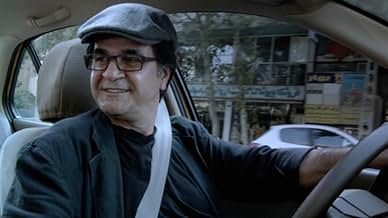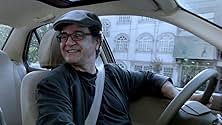Le gouvernement iranien ayant interdit à Jafar Panahi de tourner des films, il se fait passer pour un chauffeur de taxi et réalise un documentaire sur les enjeux sociétaux en Iran.Le gouvernement iranien ayant interdit à Jafar Panahi de tourner des films, il se fait passer pour un chauffeur de taxi et réalise un documentaire sur les enjeux sociétaux en Iran.Le gouvernement iranien ayant interdit à Jafar Panahi de tourner des films, il se fait passer pour un chauffeur de taxi et réalise un documentaire sur les enjeux sociétaux en Iran.
- Récompenses
- 8 victoires et 8 nominations au total
Avis à la une
Filmed via a number of small cameras, some fixed within the taxi itself, some carried around by other protagonists, the story sees Panahi acting as a cab driver and encountering pieces of the Iranian Weltanschauung. The irony of his position is highlighted as his first passenger criticizes his geographical orientation, noticing that something must have gone seriously wrong for Panahi in order for him to have to resort to something he has no clue about. And after a short argument between passengers about whether stealing the wheels off a car should warrant the death penalty or not, "just to send a message", you get the sense of how easily people become desensitized to such matters if only they are faced with them frequently enough. Paradoxically, the man suggesting this course of action is a "freelancer" himself, but more of a Robin Hood mold, which apparently should exempt him from a similar punishment.
This contradiction between wrong and right is explored throughout the journey, as Panahi encounters a series of colourful characters: a man selling pirated international films (who actually recognizes the director and takes quick advantage of him), a woman weeping over her dying husband, two older women fighting for their lives, an old neighbour who had recently been the victim of a robbery, a woman suffering a similar fate of marginalization due to the her political views, and Panahi's niece, who is just being introduced to what "publishable films" are in Iran.
Panahi strikes a fine balance between some more comical aspects of Iranian life and the very dire need for self expression, that is severely limited. The humanism that pervades Taxi poses the same question repeatedly: what causes crime and who is a criminal within Iranian society? Drawing from a well of personal experience, he manages to create an endearing context for all his protagonists and their tales and it feels like he is taking us by the hand and guiding us, not so much physically, as emotionally. His smile spreads these emotional cues, from affection to sympathy, confusion and intense discomfort, and this gives off the sensation of being joined by a friend throughout this journey.
The worst that can be said is that the scripting of events does occasionally feel a bit heavy handed, in order to condense all the experience in what is ultimately a very short film. And while generally avoiding the lure of leaning too heavily on caricature, it ends on a slightly underwhelming artistic note.
But those are all the complaints I have to make. I very much enjoyed Taxi and gathering from the vibe around me, so did many of the other people watching it. While I feel the focus should generally be on the art, more than on the artist, here's hoping that Panahi will have the chance to one day echo the affection he receives and generates in festival venues around the world, by having the freedom to openly appear alongside Iranian artists and their uncensored visions.
As far as his latest film, Taxi, is concerned it's an extremely strange project--so strange I really cannot rate it. The film is completely untraditional and I've never seen anything like it. The film looks like a documentary with no real actors, though the story is in fact a story and the folks participating are not unsuspecting members of the public. In the film, Panahi plays himself and he's inexplicably driving a taxi and using a dashcam to record his passengers. The recordings are supposedly meant to illustrate some of the societal themes Iranians are struggling with and they supposedly talk without realizing they are being filmed. Among the many themes you learn about is an underground cottage industry which illegally disseminates banned Western films, how the incredibly strict Sharia Law is impacting society negatively as well as the overall climate of suspicion and secrecy. It's all incredibly strange and looks a lot like a reality television show...albeit one set in Iran.
So did I love the film? No...not really. It is very interesting and thought-provoking but it also lacks the sort of narrative or style of a film. There are no real opening or closing credits and it looks more like raw footage of Panahi and his passengers was simply smuggled out of the country. Because of this, you cannot rightfully give the film a score such as an A, B or C...it's more a piece of art that also has the ability to place the viewer into the cab along with these people to glean little snippets of their lives and their concerns. Intriguing and out this week on Netflix.
This movie entirely set in a taxi, well, the cameras never leaves the car, but car roams around the city, Tehran. A real time movie that runs for nearly 80 minutes. There's no open or the end credits other than the title texts and some statements. The story was very interesting, that I don't know whether it was scripted or factual, but the planning was so good to shoot it in a low profile.
All the actors except the director were non pros. That definitely needs a loud applaud, because the outcome tells the quality of their exhibition. It gives a glimpse of the life as a taxi driver who sees the city through his eyes and meets the people. Some scenes were extremely funny, some were dark humours and some were thoughtful. Each time when a new character enters the frame, a new topic has brought with them and discussed, that mean the movie is totally engaging with a variety that keeps you hooked till the final.
"We already have the world record of hangings after China."
I think the end was very smart, because of that kind of conclusion and no post-production credits, I thought that's how the archives were smuggled out of the country and made it ready. But no one knows the truth how it all has been done, otherwise Jafar Panahi would have landed in a trouble. A rare gem and one of the best of 2015 that you must try it if you are a film fanatic.
Initially, I mean before decide to watch it, I was not sure it will reach my expectations. When I sat for it, the experience was different and now I am extremely happy for giving it a try. Opinion might vary about the film, but the effort must be appreciated. Especially in a circumstance where the filmmaker has everything against him, I meant legally, but came strong in what he believes is his passion. That is inspiring and also for a risk he has taken really paid off.
It won a few Internation Filmfare awards and that's how I actually came to know about this. I'm positive this film won't disappoint you as well, well, if you are not looking for twists and turns like an intelligent or a big budget film. As I said, I could have not asked a better than this, a very simple yet entertaining movie.
8/10
A highly emotionally satisfying miniature. On the surface it feels small and funny, but underneath it is seething in anger and defiance at the Iranian government. One of the stuff that makes the movie so unusual is that it is so difficult to pinpoint whether everything is planned or caught in the spur of the moment. Especially the final scene which kept my mind wondering. I really like this a lot. More so when I found out about the sad state of affairs for Jafar Panahi. He is actually banned from making movies for 20 years because he was deemed to have crossed the "sordid realism" line drawn by the Iranian government. How he subtly pokes fun at the authorities is hilarious and yet warm. The whole 80+ min film feels like a window into another world, a world not unlike ours, especially when Eric Khoo's most recent film is deemed "unscreenable". One of the most important films I have seen this year. Now I feel like hunting down The White Balloon, Closed Curtains and This Is Not a Film.
In Tehran Taxi, Panahi masquerades as a taxi driver and picks up a range of curious passengers throughout Tehran; from a couple of old ladies nursing a goldfish in a bowl, a mugger, a flower seller and a traffic accident victim.
It's an unusual style, but one made familiar by dash-cams across the world and both the subject matter and style of interlocking stories reminded me of Jim Jarmush's 1991 film 'Night on Earth'.
Panahi isn't a comedian, but his style is lighthearted. The fact he is a film maker rather than a real taxi driver also means that he doesn't know many directions around the city and he further bemuses passengers when he refuses to take payment at the end of the ride. Equally though film paints an interesting picture of the everyday lives of the passengers and the buzz of the city going on on the streets of Tehran outside of the taxi's window.
Tehran Taxi is an excellent film. Sit back and enjoy the ride!
Le saviez-vous
- AnecdotesShortly after the film's premiere at Berlin was announced, Jafar Panahi released an official statement in which he promised to continue making films despite the ban and said, "Nothing can prevent me from making films since when being pushed to the ultimate corners I connect with my inner-self and, in such private spaces, despite all limitations, the necessity to create becomes even more of an urge."
- Citations
Nasrin Sotoudeh: They work in a way that let us to know they are watching us.Their tactics are obvious.First, they write you up a police record. Suddenly, you are accused of being an agent for Mossad, The CIA, or MI6. Then they tack on something about your morals, your lifestyle. They make your life into a prison.Although you are released from prison, but the outside world is only a bigger prison.They make your nearest friends into your worst enemies.After that you think all you can do is either leave the country or pray to return to that hole. So i think it's better to let it go.
- ConnexionsReferenced in Film Junk Podcast: Episode 547: The Revenant and Best of 2015 (2016)
Meilleurs choix
- How long is Taxi?Alimenté par Alexa
Détails
Box-office
- Montant brut aux États-Unis et au Canada
- 321 642 $US
- Week-end de sortie aux États-Unis et au Canada
- 22 531 $US
- 4 oct. 2015
- Montant brut mondial
- 3 906 227 $US
- Durée
- 1h 22min(82 min)
- Couleur
- Mixage


